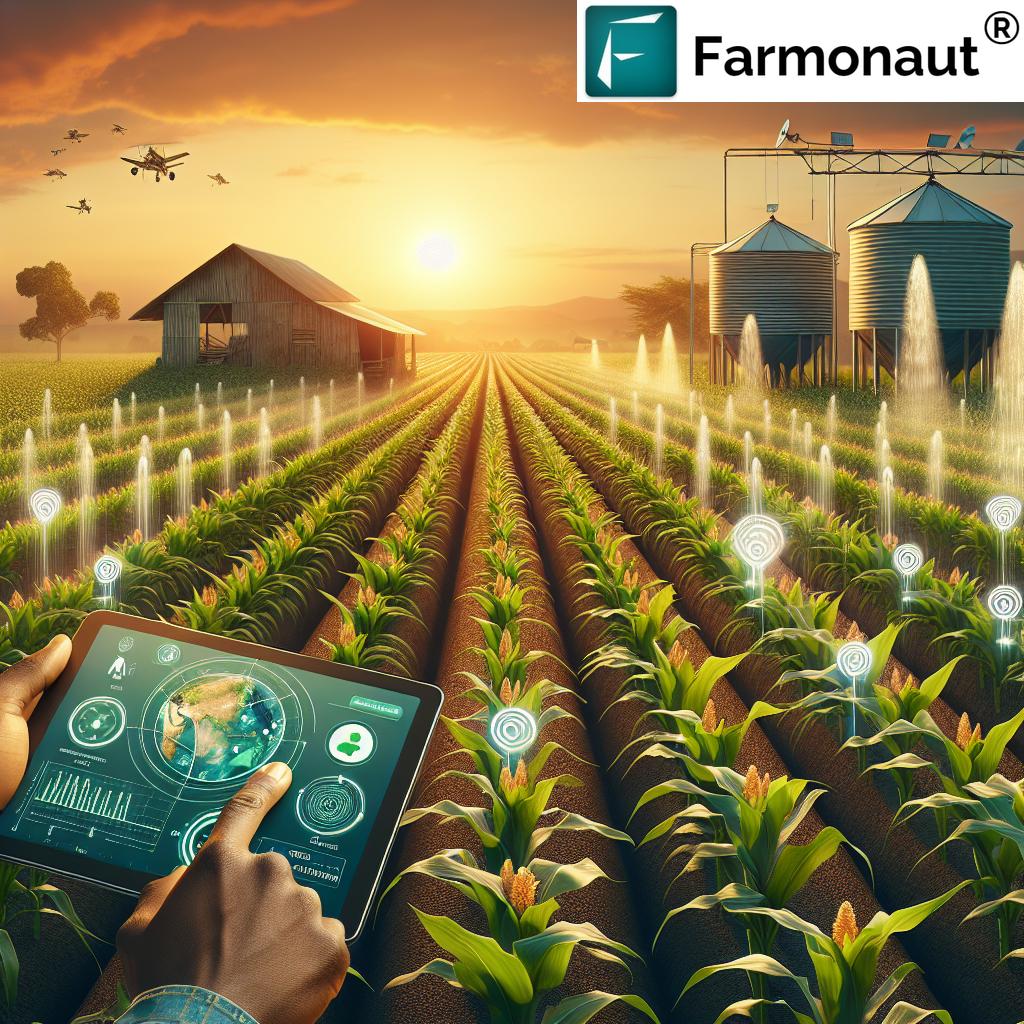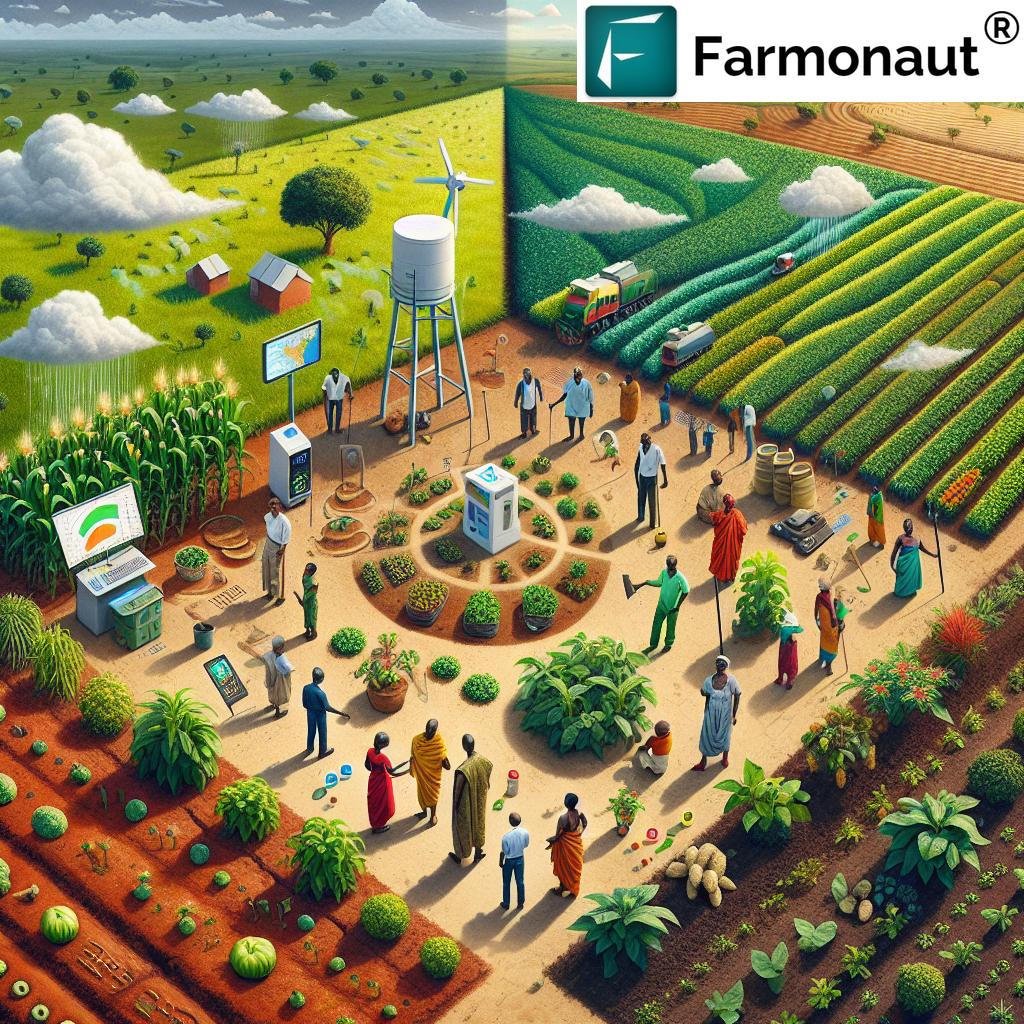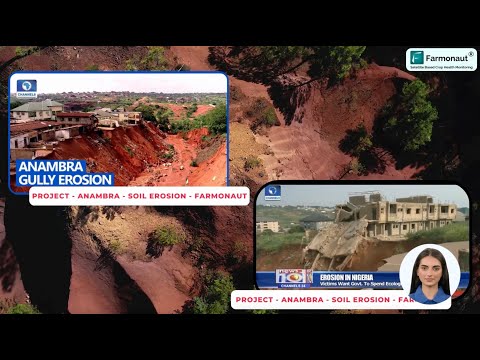Empowering Ghanaian Smallholder Farmers: Climate-Resilient Agriculture for Sustainable Food Security
“Innovative agritech solutions have increased crop yields for Ghanaian smallholder farmers from 2 to 4 metric tons per hectare.”
Welcome to our comprehensive exploration of climate-resilient agriculture and its transformative impact on smallholder farmers in Ghana. As we delve into this crucial topic, we’ll uncover how innovative agritech solutions are revolutionizing farming practices, boosting productivity, and enhancing food security across Africa. Our journey will take us through the challenges faced by Ghanaian farmers, the cutting-edge technologies addressing these issues, and the promising future of sustainable agriculture in the region.
The Landscape of Smallholder Farming in Ghana
Ghana’s agricultural sector is the backbone of its economy, with smallholder farmers playing a pivotal role in food production. These hardworking individuals, typically cultivating less than two hectares of land, face numerous challenges that impact their productivity and livelihoods. Let’s examine the current state of smallholder farming in Ghana:
- Limited access to modern farming techniques and technologies
- Vulnerability to climate change impacts, including erratic rainfall patterns and rising temperatures
- Soil degradation and declining fertility
- Inadequate access to quality seeds and inputs
- Insufficient financial resources and limited credit options
Despite these obstacles, smallholder farmers in Ghana demonstrate remarkable resilience and a willingness to adopt innovative solutions. This is where climate-resilient agriculture comes into play, offering a beacon of hope for sustainable food security.

Climate-Resilient Agriculture: A Game-Changer for Ghana
Climate-resilient agriculture encompasses a range of practices and technologies designed to help farmers adapt to changing environmental conditions while maintaining or increasing productivity. For smallholder farmers in Ghana, this approach is proving to be transformative. Here’s how:
- Improved Crop Varieties: The development and adoption of hybrid maize seeds and other climate-adapted crop varieties are enhancing yields and resistance to pests and diseases.
- Precision Farming Techniques: Advanced remote sensing and GIS tools are enabling farmers to make data-driven decisions about planting, irrigation, and harvesting.
- Soil Conservation Practices: Implementing techniques like conservation tillage and agroforestry helps maintain soil health and moisture retention.
- Water Management: Efficient irrigation systems and water harvesting techniques are crucial in areas experiencing irregular rainfall patterns.
- Integrated Pest Management: Sustainable pest control methods reduce reliance on chemical pesticides while protecting crops.
These climate-resilient strategies are not only improving agricultural productivity but also contributing to long-term environmental sustainability and economic stability for Ghanaian farmers.
Farmonaut: Pioneering Agritech Solutions for Smallholders
At the forefront of this agricultural revolution is Farmonaut, a cutting-edge agritech company dedicated to making precision agriculture accessible and affordable for farmers worldwide. Our innovative platform integrates satellite technology, artificial intelligence, and data analytics to provide smallholder farmers with powerful tools for enhancing their agricultural practices.
Here’s how Farmonaut is empowering Ghanaian smallholder farmers:
- Satellite-Based Crop Health Monitoring: Our advanced remote sensing technology allows farmers to track crop health in real-time, enabling early detection of issues and timely interventions.
- AI-Powered Advisory Services: The Jeevn AI system provides personalized recommendations for crop management, helping farmers optimize their practices based on local conditions.
- Weather Forecasting and Climate Adaptation: Accurate weather predictions and climate data assist farmers in planning their activities and adapting to changing patterns.
- Resource Optimization: Our platform helps farmers make informed decisions about input usage, reducing waste and improving efficiency.
By leveraging these technologies, smallholder farmers in Ghana can significantly improve their resilience to climate change and boost their overall productivity.
The Impact of Climate Change on Ghanaian Agriculture
“Rising temperatures and erratic rainfall patterns significantly impact crop yields for over 80% of Ghana’s agricultural production.”
Climate change poses a significant threat to agricultural productivity in Ghana. The country’s farmers are experiencing:
- Increasing temperatures, leading to heat stress on crops
- Unpredictable rainfall patterns, causing droughts and floods
- Shifting growing seasons, disrupting traditional planting calendars
- More frequent and severe pest invasions
These challenges underscore the urgent need for climate-resilient agricultural practices. By adopting innovative solutions and technologies, smallholder farmers can mitigate these risks and ensure sustainable food production for future generations.
Innovative Solutions for Ghanaian Smallholder Farmers
Let’s explore some of the key innovations that are transforming smallholder agriculture in Ghana:
1. Hybrid Maize Seeds
The introduction of hybrid maize seeds has been a game-changer for Ghanaian farmers. These improved varieties offer:
- Higher yields compared to traditional varieties
- Better resistance to pests and diseases
- Improved tolerance to drought and heat stress
By adopting hybrid maize, smallholder farmers can significantly increase their productivity, with yields potentially doubling from 2 to 4 metric tons per hectare.
2. Precision Farming with Remote Sensing
Farmonaut’s satellite-based crop monitoring system is revolutionizing farming practices in Ghana. Our technology enables farmers to:
- Monitor crop health in real-time
- Detect early signs of stress or disease
- Optimize irrigation and fertilizer application
- Make data-driven decisions for improved crop management
To learn more about our satellite-based solutions, visit our API page or explore our API Developer Docs.

3. Optimized Inputs
Efficient use of agricultural inputs is crucial for sustainable farming. Our AI-powered advisory system helps farmers:
- Determine optimal fertilizer application rates
- Identify the most effective pest control methods
- Reduce input costs while maximizing yields
This targeted approach not only improves productivity but also minimizes environmental impact.
4. Access to Agricultural Credit
Financial inclusion is vital for smallholder farmers to invest in their farms. Farmonaut’s satellite-based verification system supports:
- Improved risk assessment for lenders
- Streamlined loan approval processes
- Increased access to credit for smallholder farmers
By providing reliable data on farm performance, we’re helping bridge the gap between farmers and financial institutions.
The Role of Agricultural Development Programs
Collaboration between various stakeholders is crucial for the success of climate-resilient agriculture in Ghana. Agricultural development programs play a vital role in:
- Providing training and education on sustainable farming practices
- Facilitating access to modern technologies and inputs
- Supporting research and development of climate-adapted crop varieties
- Promoting market linkages for smallholder farmers
These programs, often implemented in partnership with government agencies, NGOs, and private sector companies like Farmonaut, are instrumental in driving the adoption of climate-resilient agriculture across Ghana.
Comparing Climate-Resilient Agriculture Techniques
To better understand the impact of various climate-resilient agriculture techniques, let’s examine this comparative table:
| Technique | Description | Benefits | Estimated Yield Increase |
|---|---|---|---|
| Hybrid Maize Seeds | Improved maize varieties with enhanced traits | Higher yields, better pest resistance, drought tolerance | 50-100% |
| Precision Farming with Remote Sensing | Satellite-based crop monitoring and management | Optimized resource use, early problem detection, data-driven decisions | 20-40% |
| Optimized Inputs | AI-guided application of fertilizers and pesticides | Reduced input costs, improved soil health, higher efficiency | 15-30% |
| Access to Agricultural Credit | Improved financial services for smallholder farmers | Increased investment in farm improvements, better risk management | 10-25% |
This table illustrates the significant potential for yield improvements through the adoption of climate-resilient techniques. By combining these approaches, smallholder farmers in Ghana can dramatically enhance their productivity and resilience to climate change.
The Future of Sustainable Agriculture in Ghana
As we look to the future, the prospects for sustainable agriculture in Ghana are bright. With continued investment in research, technology, and farmer education, we can expect to see:
- Wider adoption of climate-resilient farming practices
- Increased food security and reduced reliance on imports
- Improved livelihoods for smallholder farmers
- Greater resilience to climate change impacts
- Enhanced environmental sustainability in the agricultural sector
Farmonaut is committed to playing a key role in this transformation, continually innovating and adapting our solutions to meet the evolving needs of Ghanaian farmers.
Empowering Farmers Through Technology
At Farmonaut, we believe that technology should be accessible to all farmers, regardless of the size of their operation. Our user-friendly platforms are designed with smallholder farmers in mind, offering:
- Intuitive interfaces for easy navigation and data interpretation
- Multilingual support to overcome language barriers
- Offline functionality for areas with limited internet connectivity
- Affordable subscription models to ensure widespread adoption
To experience the power of our technology firsthand, download our mobile apps:
For those who prefer web-based access, our platform is also available through your browser:
Sustainable Farming Education and Support
Education is key to the successful adoption of climate-resilient agriculture. Farmonaut is committed to supporting farmers through:
- Online tutorials and webinars on using our platform effectively
- Partnerships with local agricultural extension services for on-the-ground training
- Regular updates on best practices in sustainable farming
- Community forums for farmers to share experiences and insights
By combining cutting-edge technology with comprehensive educational support, we’re empowering Ghanaian smallholder farmers to become leaders in sustainable agriculture.
Conclusion: A Sustainable Future for Ghanaian Agriculture
The journey towards climate-resilient agriculture in Ghana is well underway, with smallholder farmers at the forefront of this transformation. By embracing innovative technologies, adopting sustainable practices, and leveraging the power of data-driven decision-making, these farmers are not only increasing their productivity but also securing a more sustainable future for generations to come.
Farmonaut is proud to be a part of this agricultural revolution, providing the tools and insights needed to navigate the challenges of climate change and build a more resilient food system. As we continue to innovate and adapt our solutions, we remain committed to our mission of empowering farmers worldwide with affordable, accessible precision agriculture technologies.
Together, we can create a future where sustainable farming practices, supported by cutting-edge technology, ensure food security, economic prosperity, and environmental sustainability for Ghana and beyond.
FAQs
- Q: How can smallholder farmers in Ghana access Farmonaut’s technology?
A: Farmers can download our mobile app from the Google Play Store or Apple App Store, or access our web platform through any internet browser. - Q: What kind of support does Farmonaut offer for farmers new to precision agriculture?
A: We provide online tutorials, webinars, and partner with local agricultural extension services to offer comprehensive training and support. - Q: How does climate-resilient agriculture benefit the environment?
A: It promotes sustainable practices that conserve soil health, reduce water usage, and minimize chemical inputs, leading to improved biodiversity and reduced environmental impact. - Q: Can Farmonaut’s technology be used for crops other than maize?
A: Yes, our satellite-based monitoring and AI advisory systems are applicable to a wide range of crops cultivated in Ghana and beyond. - Q: How does improved access to credit help smallholder farmers?
A: It allows farmers to invest in better seeds, equipment, and technologies, leading to improved productivity and resilience to climate challenges.
Explore Farmonaut’s Subscription Options
Ready to take your farming to the next level? Explore our flexible subscription plans designed to meet the needs of smallholder farmers in Ghana:
Join us in revolutionizing agriculture and building a more sustainable, food-secure future for Ghana and beyond!






